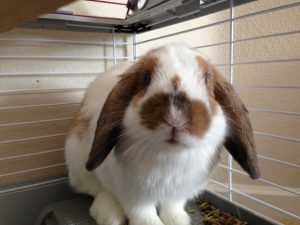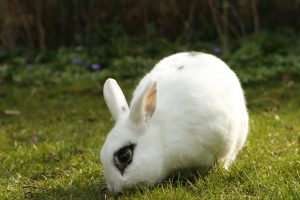Why Is My Rabbit Shaking?

Owners of rabbits often need to affect many peculiar behavioral aspects of those cute and cuddly creatures. Within the wild, rabbits are prey animals. Their visual communication is completely instinct-based. As an owner, it’ll help to thoroughly know your pet to know them. Know exactly how they behave, adapt, and answer to their environment, without getting worried.
The common reasons for shaking are fear, nervousness, and stress. A less obvious explanation for trembling is heat, as rabbits don’t tolerate high temperatures well. If your rabbit is lying on its side and shaking, it might be thanks to a digestive issue (GI stasis). Also, it’s going to have ingested something toxic.
Hiccups are commonly confused with shaking in rabbits, but they’re rarely a cause for concern. In many cases, you’ll need to look out for other physical symptoms, like scratching (in the case of mites), to work out the underlying explanation for your pet rabbit’s discomfort.
A rabbit can shake for a variety of reasons. Luckily, a number of them are less distressing than others. Hiccups are a harmless explanation for shaking in rabbits. A rabbit can also have small spasms whenever it’s hiccups. A hiccup shake can appear troubling; but, won’t harm a rabbit.
As long as hiccups last for less than 20 minutes, they aren’t a cause for concern. If your rabbit has been having hiccups regularly, check what you’ve been feeding it lately. Something new in your rabbit’s diet could also be the culprit.
A rabbit’s shake is serious if it’s in discomfort. Rabbits are at the rock bottom of the organic phenomenon. They’re highly efficient at hiding signs of pain or weakness to prevent them from being hunted.
A rabbit may shake in an effort to contain its pain. To see whether your rabbit is hurting, gently feel its body to ascertain if it reacts to you touching the chosen part of its body. You’ll need to feel various parts of its body to detect an injury or feel the stomach to see for gas.
Rabbits Shake When It’s Hot
Contrary to popular belief, rabbits can tolerate colder temperatures more than warm temperatures. A rabbit has physical adaptations, like its dense fur and building a thicker fat layer within the body to survive the weather. Heat, on the opposite hand, is probably going to form a rabbit ill.
Temperatures over 26º C will cause rabbits distress. High temperatures also will make your rabbit tremble or shake. Shaking within the heat may sound illogical as trembling is an adaptation to deal with cold temperatures. However, rabbits are dissimilar.
During the phase of high heat, a rabbit can even suffer from a heat stroke. If left untreated, your rabbit may have spasms and die. In humans, heat prostration results in many symptoms, like dizziness. Unfortunately, rabbits cannot regulate their blood heat by sweating.
According to the Asian Journal of Poultry Science, rabbits largely believe in vasodilation (dilation of blood vessels) for temperature regulation. More specifically, they expand the blood vessels near their ears. This explains why your rabbit could also be shaking its ears, or shaking its head and running.
Rabbits Shake When They’re Frightened
It’s normal for a rabbit to tremble when it’s scared. It’s easy to inform when a rabbit is frightened through its visual communication. Oftentimes, a rabbit’s nose also will vibrate in stressful situations.
Rabbits get scared for a plethora of reasons. For instance, loud noises. If your rabbit is showing signs of fear, take a glance at its habitat and keep a lookout for other possible symptoms.
Rabbits that are chronically stressed also are likely to twitch, tremble, or shake. Side swaying and head bobbing are usually tell-tale signs of utmost stress in rabbits. Some experts believe shaking could also be a self-soothing function in stressed rabbits.
A New Habitat
A rabbit may get stressed or scared thanks to a change in surroundings or trauma. If you’ve just brought your rabbit home, it’s going to be missing its previous environment at the farm or within the pet store. It’s going to even be missing its siblings, mother, or other playmates.
Unwanted Company
Some rabbits that are won’t be solitary do not tolerate other rabbits or pets near them and thus, get easily frightened once they have company.
Mites
Mites can affect rabbits in several ways: ear mites, fur mites, and burrowing mites. Mites can cause your rabbit’s ears to shake.
Ear mites are found inside the ear near the pinnae. They will cause severe irritation in rabbits; but, aren’t so common in indoor rabbits. However, you’ll easily bring mites into your home through your clothes or shoes and transfer them to your pet.
Fur mites are common around springtime in rabbits. The areas most affected are often the rear and therefore the neck. Fur mites can appear as if the dust is on your rabbit’s fur. If your rabbit is affected by a case of fur mites, it’ll be continually scratching the affected area of its body.
With burrowing mites, a female mite digs into your rabbit’s skin, laying her eggs within the burrowed region. The larvae hatch and still thrive on your rabbit’s body. Mites can lay 5 eggs up to five times, and this will happen within 2-3 weeks. You will see the white dust on your rabbit’s fur if it’s been infested with burrowing mites.
Any mite infestation can cause severe discomfort and stress in rabbits. Your rabbit may shake because its ears are itchy, or because it’s feeling distressed. Take your rabbit to a vet immediately for treatment if it’s any of the above mites.
Why Rabbit Shaking

All in all, these are a few reasons why your rabbit is shaking. Based on our discussion, you can identify which are the reasons causing your rabbit shaking. On top of that, there are also a few ways to prevent shaking which are diet, hygiene, the surrounding temperature, removing stressors, and avoiding over-handling as that can make them feel stressed. While some causes of trembling in rabbits are serious and need immediate medical attention, others don’t.
https://www.rabbitproducersassociation.com/why-is-my-rabbit-shaking/https://www.rabbitproducersassociation.com/wp-content/uploads/2021/04/Why-Is-My-Rabbit-Shaking-3.jpghttps://www.rabbitproducersassociation.com/wp-content/uploads/2021/04/Why-Is-My-Rabbit-Shaking-3-150x150.jpgUncategorizedOwners of rabbits often need to affect many peculiar behavioral aspects of those cute and cuddly creatures. Within the wild, rabbits are prey animals. Their visual communication is completely instinct-based. As an owner, it'll help to thoroughly know your pet to know them. Know exactly how they behave, adapt,...ArifArif ariffadzli22@gmail.comAuthorNetherland Dwarf Rabbit


Leave a Reply